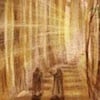For an explanation of the methodology of this series, see the introduction.
"Our father died in the desert, but he was not in the assembly that banded together against the Lord in Korach's assembly, but he died for his own sin, and he had no sons." (Num. 27:3)
Peshat (basic meaning):
Rashi: "but he was not"
He was among those who ascended [the mountain] defiantly.
Since they were going to say that "he died for his own sin", they [Zelophehad 's daughters] had to say that it was not for the sin of those who grumbled, and [that he was] not in Korach’s company who incited [the people] against G‑d, but he died for his own sin alone, and he did not cause others to sin with him. R. Akiva says, He was the wood gatherer, (see Num. 15:32) and R. Shimon says: He was among those who ascended [the mountain] defiantly. (see Num. 14:44)
Derash (interpretive meaning):
Ramban: In my opinion, they [Zelophehad's daughters] spoke this way because they thought that Moses hated the company of Korach more than all the other sinners because they rebelled against him and denied Divine approval of this deeds. The daughters told him that their father was not one who died in the plagues, but that he died a natural death in the wilderness in his bed, "in his sin" because he was not worthy to enter the land as punishment for his sin.
They said "in the desert" to emphasize...that he was worthy of redemption.Ohr HaChayim: They said "in the desert" to emphasize not in Egypt and that he was worthy of redemption. Also by using "in the desert" they implied that he was amongst those whose death in the desert had been decreed by G‑d as a result of the debacle of the spies. Moreover, the Zohar holds that the desert is the domain of Satan and this was the reason people committed sins were punished promptly. They indicated that had their father done his sin in any other place, punishment would have been delayed giving him a chance for teshuvah.
Mei HaShiloach: Why was the temporary situation of the daughters of Zelophehad placed at the end of the Torah's narrative? Would not a general story which is universally applicable be a better choice with which to end this book of the Torah? The answer is that this is exactly our lesson: our task is to understand the mitzvahs, the compelling force of the Torah in each time in which we live. We have to ask ourselves at each moment, "What is G‑d's will now?"
Hopefully the light of Torah will reach out and shine to us and enlighten our questions. That is why this temporary situation was placed here—as an example of Torah study which was to come. In post-Biblical time there will always be temporary situations and we won't know how to handle them. The entire Torah should be seen as advice and suggestions for each person to help him or her understand what G‑d may want in each case.
The Lubavitcher Rebbe: According to Rashi, the story of Zelophehad's daughters stress how women have many impressive qualities superior to men. In our times too, the superior qualities of women are crucial to the survival of the Jewish people. This fact comes to light when one considers the long- reaching effects of the mitzvahs whose observance in entirely in their hands. The woman who is practically responsible for the laws of family purity and kashrut in the home has a major influence on the destiny of the Jewish people. For by molding refined characteristics into her children's nature, she paints a brighter future for the next generation. This is a unique privilege which is entrusted in the hands of the Jewish woman.
Sod (esoteric, mystical meaning):
...his sentence was left unsaid and not explained...
Zohar Shelach:
Rabbi Hiya said that it is written: "They found a man gathering sticks
['trees] upon the Shabbat day." (Num. 15:32) What are the trees involved
here and who is he? That must be Zelophehad, who was particular about
these trees—which of them was greater than the other. He did not care for the
glory of his Master and exchanged the Shabbat to the other Shabbat. This is what
is written: "But he died in his own sin [Het'o -spelled
Het Tet Aleph Vav]" (Num. 27:3); in the sin [Het Tet
Aleph] of the Vav, he died. Therefore, his sentence was left unsaid
and not explained as other sentences. Because this matter had to be in secrecy
and veiled and not made known. Therefore, it was not mentioned openly and G‑d
glorified His own glory.
Rabbi Yosi said: He [Zelophehad] was gathering other
trees, together with the Shabbat. He received his timely punishment and his
iniquity was forgiven. Therefore, Moses had difficulty in judging the sentence
of his daughters, since he was not sure if it was forgiven, and if his daughters
would take their lot and inheritance or not. As soon as G‑d mentioned his name,
as is written: "The daughters of Zelophehad speak right" it became known
that his sin was forgiven.
BeRahamim LeHayyim:
Zelophehad sinned against the letter Vav, as
the Zohar parses "his own sin" into 'sin of the
vav'. Perhaps this is why this episode appears
as if out of nowhere, and why his daughters reminded Moses about it. For
Zelophehad, in doing this work in public, exchanged the Shabbat of holiness for
a Shabbat done just for one's own pleasure, not for the glory of G‑d.
Here's how we may have thought it can work.
Shabbat is a day of rest, right?
We say in kiddush on Friday night: It
says that G‑d rested from all of his work. So Shabbat is a day of rest, right?
And if it is restful for me to (1) work out, (2) paint,
(3) garden, (4) cook, (5) play a musical instrument, (6) go for a drive in the
county, etc, aren't I doing the spirit of Shabbat? I'm resting like G‑d, right?
Sorry, but Traditional Judaism answers with a resounding
"no."
These weekday activities if done properly can all have
tremendous spiritual benefit. No denying that. But "ki bo shabat mikol
melachto" means that G‑d rested from all constructive activity,
later defined to be those labors used to built the Tabernacle. The Sages of the
Talmud expanded the definition of the 39 chief labors to also include their
derivative labors.
If we exchange the Shabbat of the Torah and the Sages for
the Shabbat that we want on our terms, perhaps we are doing what Zelophehad did.
We are told that Zelophehad did what he did for a sanctification of the Divine
Name, namely he gave up his life so that others—we included—could learn by his
lesson.
Copyright 2003 by KabbalaOnline.org, a project of Ascent of Safed (//ascentofsafed.com). All rights reserved, including the right to reproduce this work or portions thereof, in any form, unless with permission, in writing, from Kabbala Online.






Start a Discussion